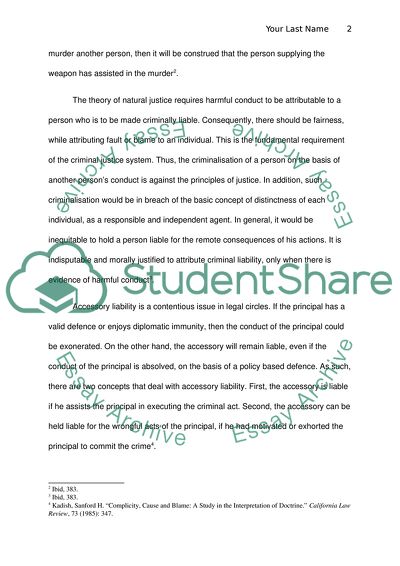Cite this document
(Mens Rea in Relation to Accessories Essay Example | Topics and Well Written Essays - 1500 words - 1, n.d.)
Mens Rea in Relation to Accessories Essay Example | Topics and Well Written Essays - 1500 words - 1. https://studentshare.org/law/1747765-the-law-on-the-means-rea-for-accessories-is-quite-simple-whether-in-relation-to-murder-or-otherwise-it-simply-depends-on-whether-what-the-principle-did-is-within-the-scope-of-what-the-accessory-contemplated-discuss
Mens Rea in Relation to Accessories Essay Example | Topics and Well Written Essays - 1500 words - 1. https://studentshare.org/law/1747765-the-law-on-the-means-rea-for-accessories-is-quite-simple-whether-in-relation-to-murder-or-otherwise-it-simply-depends-on-whether-what-the-principle-did-is-within-the-scope-of-what-the-accessory-contemplated-discuss
(Mens Rea in Relation to Accessories Essay Example | Topics and Well Written Essays - 1500 Words - 1)
Mens Rea in Relation to Accessories Essay Example | Topics and Well Written Essays - 1500 Words - 1. https://studentshare.org/law/1747765-the-law-on-the-means-rea-for-accessories-is-quite-simple-whether-in-relation-to-murder-or-otherwise-it-simply-depends-on-whether-what-the-principle-did-is-within-the-scope-of-what-the-accessory-contemplated-discuss.
Mens Rea in Relation to Accessories Essay Example | Topics and Well Written Essays - 1500 Words - 1. https://studentshare.org/law/1747765-the-law-on-the-means-rea-for-accessories-is-quite-simple-whether-in-relation-to-murder-or-otherwise-it-simply-depends-on-whether-what-the-principle-did-is-within-the-scope-of-what-the-accessory-contemplated-discuss.
“Mens Rea in Relation to Accessories Essay Example | Topics and Well Written Essays - 1500 Words - 1”. https://studentshare.org/law/1747765-the-law-on-the-means-rea-for-accessories-is-quite-simple-whether-in-relation-to-murder-or-otherwise-it-simply-depends-on-whether-what-the-principle-did-is-within-the-scope-of-what-the-accessory-contemplated-discuss.


